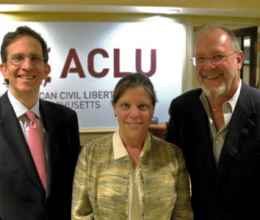
A new generation of technologists fighting for a just future
Blog by Nasser Eledroos, technology fellow at the ACLU of Massachusetts
Employment opportunities in the technology industry are largely corporate. On the surface, these jobs seem fulfilling: great pay, opportunities for advancement, stock options, and other perks.
But where do you turn when you find that your dreams to innovate, engineer, and design a better future slam against the bleak reality that existing technologies often enable and facilitate great harm? What do you do when you find that the “efficiency engines” we’ve created end up subverting democracy, surveilling protected First Amendment activity, or deepening existing inequalities?
There’s a community of people and organizations, like the Ford Foundation, asking these same questions – a growing field – Public Interest Technology – where people are using their experience and skills in technology to change the world for the better. Public interest technology is exactly what it sounds like – technology used to serve justice and the public interest. Where almost any other corporate tech position has a fiduciary responsibility to maximize profit for shareholders, a public interest technologist is instead asked to service the public good.
My journey as a public interest technologist began with an abrupt transition out of the software engineering world and into a new role with the ACLU of Massachusetts. My very first day at the ACLU highlighted how technology can do good in the world: Day one involved me sifting through thousands of court records to determine how many cases had been dismissed as part of the single largest dismissal of wrongful convictions in the legal history of the United States. Central to those dismissals was the work of Paola Villarreal, the Technology Fellow who worked at the ACLU of Massachusetts before me. Paola’s work demonstrated that, contrary to the prosecutors’ claims, the majority of the tainted cases were for simple drug possession, and the vast majority were low-level cases tried in district courts. Public interest technologists design and deploy technology that serves people and solves problems – in this case, identifying tens of thousands of people who were wrongfully convicted based on tainted evidence.
Public interest tech is a field that’s still being defined, but like many other jobs in the non-profit world, it involves wearing many hats. During my time at the ACLU, I’ve supported the organization as a data scientist, systems administrator, forensics engineer, graphic designer, web developer, writer, advocate, IT specialist, geographic information system engineer, and public speaker. I’ve performed data-driven investigations into how police in Boston surveil people online, supported advocacy to remedy the Massachusetts drug lab scandals, led the data work on a grassroots statewide court watch project, and taught people about critical digital security practices. The different roles share a common thread: in organizations like the ACLU, technology can – and should – be used to ward off threats, entwine policy and computer science, and take full advantage of technology’s transformative potential.
I didn’t walk into the ACLU an expert in the above topics and issues. But my job afforded me the flexibility to take the time necessary to familiarize myself with the tools, policies, and skills I would need to succeed in this role. Traditional academic disciplines often aren't built to help students learn and apply technical expertise to advance the public interest – and that should change. This summer, the Ford Foundation convened university presidents, provosts, and faculty to explore pathways for people pursuing public interest technology, to bring institutional weight to the campaign to build this career path.
As technology continues to advance and outpace policy and law, there will be an ever-increasing need for public interest technologists. Decades ago, lawyers didn’t have a pipeline into policy and civil society; institutions purposefully built this path and called it public interest law. Technologists need to do the same today. Together, we can build a field that helps organizations and government agencies navigate issues of algorithmic bias, online surveillance, digital privacy, free expression, and more. Our collective future depends on the success of this initiative.
Interested in learning more? Visit the Ford Foundation or explore the ACLU of Massachusetts Technology for Liberty Project.
Related content

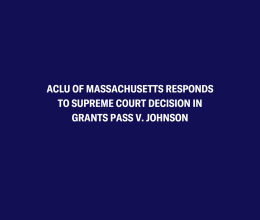
ACLU of Massachusetts responds to Supreme Court decision in Grants...
June 28, 2024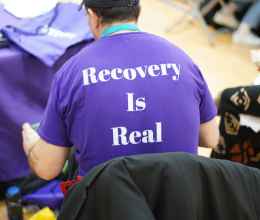
Massachusetts for Overdose Prevention Centers comment on new VT law...
June 18, 2024
ACLU applauds new landmark data privacy legislation
May 6, 2024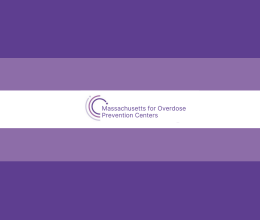
Labor unions in Massachusetts join MA4OPC Coalition to support...
April 4, 2024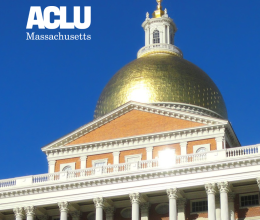
ACLU of Massachusetts comment on Governor’s Council approval of...
April 3, 2024
ACLU of Massachusetts v. Bristol District Attorney’s Office
March 26, 2024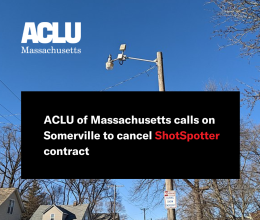
ACLU of Massachusetts calls on Somerville to cancel ShotSpotter...
March 14, 2024